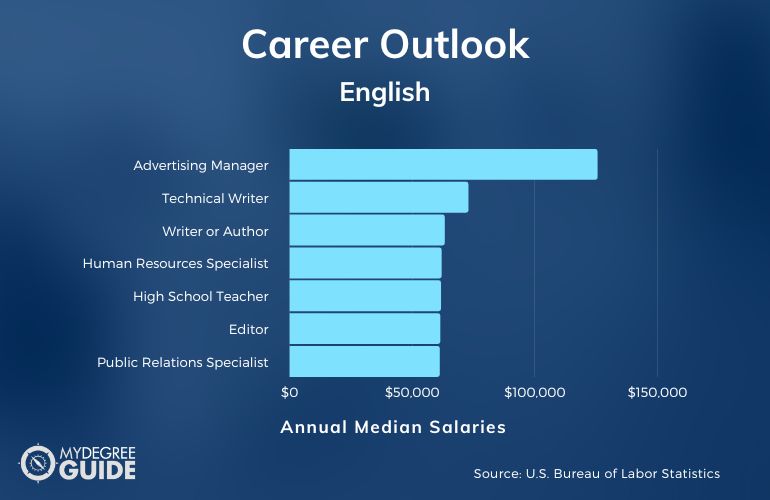What can you do with an English degree? See the possibilities for your future career here.

If you love words, language, speaking, or writing, then you might be intrigued by the idea of an online English degree.
Editorial Listing ShortCode:
Don’t let thoughts of “What can I do with an English degree?” hold you back. Instead, start exploring all the possibilities that bachelor’s degrees in English have to offer.
Types of English Degree Programs
Studies related to the English language come in all different forms. You can focus your college years on a particular aspect of language by choosing a degree concentration or a specialty major.
Click one of these areas to jump to that part of the page.
Choosing a specific track for your online English degree can allow you to study topics of interest to you. It may also increase your suitability for certain jobs after graduation. Combine these together and you should quickly see what makes an English degree worth it.
English – General

A generalist degree program doesn’t concentrate on any one aspect of the English language. Instead, it covers topics that range from literature to composition.
Your required classes may include Introduction to Composition, Linguistics, Literary Theory, and Literature Analysis.
Many schools allow general English majors to round out their degree programs with electives of their choosing. Your options may include various genres of literature, such as poetry, Shakespeare, short stories, British dramas, or contemporary fiction.
You may also have the opportunity to select specialty writing classes, such as workshops in poetry, nonfiction, or creative writing. Other elective courses you may do allow you to explore film, travel writing, editing, or business communications.
Many of these courses can be accessed through either an online English degree program or an accelerated English degree online program as well.A generalist English degree may be useful for those who want to pursue a job in teaching, editing, publishing, or copywriting.
Creative Writing

If you want to approach your English studies from an artistic standpoint, then a degree program focused on creative writing might be for you. During your college years, you may study the works and styles of famous writers and refine your own ability to produce compelling written works.
As a foundation for your creative writing studies, you’ll likely need to do classes like Introduction to Creative Writing, World Cultures and Traditions, and Literary Theory.
Then, you may be able to do creative writing classes that are specific to the type of writing you’d like to do. Subjects may include plays, short stories, film scripts, poetry, creative nonfiction, and novels.
Your creative writing major may help you become a professional poet, novelist, screenwriter, journalist, or blogger. You might also go into teaching, editing, advertising, or public relations.
Film Studies

A film studies program can help you learn about the art of communication through video formats. This major unites traditional language studies with an exploration of modern technology.
Your courses may cover the history of cinema and address modern media formats. You may learn about different types of films, including narrative and documentary. You may spend time on various genres of writing, such as journalistic reporting and screenwriting.
Technical classes may cover aspects of film production. Classes like Movies and Culture or Media and Politics may allow you to explore how film production can shape the world around us and discuss ethical issues related to that responsibility.
This major can help you prepare for a job in directing, producing, or talent scouting. You might also be a film critic or a social media manager, or you could do advertising or marketing.
Literature

A literature degree may be fairly similar to a generalist English degree, but you can expect to spend less time learning to produce original compositions and more time studying others’ written works. This is an intellectual discipline that may serve as a good foundation for graduate studies.
Literature students often look at historical and cultural settings as they consider works from various periods.
For example, in Nineteenth-century British Fiction, you might study what life and politics were like for people at that time and read works by Jane Austen and Charles Dickens.
You’ll probably be able to choose several different electives, so if British literature isn’t your thing, you might do classes on slam poetry, science fiction, children’s literature, Shakespeare, or folk writings instead.
This degree may help you become a fiction or nonfiction writer. Other job options include publishing, journalism, librarianship, or editing.
Technical Communication

A technical communication program can help you learn how to present complex information to the general public in a way that is clear and understandable. This requires both industry knowledge and writing proficiency.
Coursework for this concentration typically emphasizes both composition and science. Introductory courses in technical writing and editing may serve as a foundation for higher-level electives.
You may opt to take classes on grant writing, social media strategies, data visualization, or project management. User experience may be an important component of your studies since technical writing is only effective if the end users can comprehend your message.
Graduates may pursue a job in technical writing or editing. Web developers and user experience specialists may also benefit from this degree. Other career paths to do include technical training, public relations, and graphic arts.
What Will You Learn in an English Degree Program?

English majors study the English language, of course! But what exactly does that mean? You’ll be likely to cover many key areas during your language studies. These may include linguistics, composition, and literature.
Linguistics provides a background for English studies. Topics you may explore include grammar, the history of the language, the roots of words, and the life cycle of languages. You may discuss language acquisition, sentence structure, and reading for meaning.
Your writing classes can help you learn how to use the English language to clearly communicate with others. Here are some common courses included in English programs:
- Introduction to College Composition: This foundational class is designed to equip students with essential skills for writing research papers and completing other written assignments at the college level.
- Nonfiction Writing: This course teaches students how to create nonfiction works that are both informative and engaging. They may focus on a particular subset of nonfiction publications, such as environmental articles or travel books.
- Poetry Workshop: This classes covers a variety of poetry forms. It typically gives students the opportunity to share their writings with their classmates on a regular basis.
Literature is another important focus of your English studies. You should learn to read critically and have opportunities to explore texts from various genres and historical periods.
- Literary Criticism: This foundational class teaches how to interpret and draw meaning from texts and how to compose papers that summarize insights on pieces of literature.
- Shakespearean Writings: This class covers the life of William Shakespeare and gives opportunities to explore his sonnets and plays.
- Short Stories: This course gives students opportunities to learn about the short story format and analyze a number of examples. The class may focus on one subset of this genre, such as American short stories.
English majors often have the opportunity to select several electives, so your course list may be quite different from the one above.
What Can You Do with an English Degree After You Graduate?
One of the great things about an English bachelor’s degree is its versatility. After finishing your undergraduate studies, there are quite a few different paths you may do. Graduates can consider going straight into the workforce. Enrolling in graduate school is another popular option.
Graduate studies for English majors aren’t limited to any one discipline.
While you can stick with a program that’s quite similar in nature to your bachelor’s program, keep in mind that the writing and communication skills you learned in your undergrad classes can prove useful in a number of different master’s tracks.
Education

If you didn’t take education classes as part of your undergrad program, then getting your master’s can help prepare you for state teaching licensure. You could focus your master’s on a specific area of education, such as instructional technology, secondary education, or curriculum and instruction.
English

You can deepen your English studies by enrolling in a related grad program. Areas of focus may include rhetoric, composition, or period literature. Many master’s programs in English have a heavy focus on literary theory.
Journalism

Studying journalism can help you learn how to use your communication skills to relay information to the public. Your master’s program may prepare you for roles that involve print, television, or online media as a writer or investigative journalist.
Law

Many law students start as English majors because it is essential for lawyers to be strong writers and communicators. If you’re interested in pursuing a graduate degree in law, consider taking pre-law classes during your bachelor’s program.
Library and Information Science

Your love of literature may compel you to work in a library. To become a certified librarian, you must have a master’s degree. This program can also help you become an archivist or a researcher.
What Kind of Jobs Can You Get with an English Degree?
An English program can help you learn how to think critically and communicate clearly. Those skills and experience can serve you well in a wide variety of jobs.
Business

Many companies can employ the skills of good writers and communicators, and the liberal arts focus of your education may help you acclimate to work in any sector.
Business roles for English majors include:
- Communications coordinator
- Fundraiser
- Human resources specialist
- Public relations specialist
If you pursue a career in the business world and want to go back to school, think about getting an MBA.
Marketing

Being good at communicating and getting a point across may help you succeed in the marketing field.
Career paths to consider include:
- Advertising
- Copywriting
- Digital marketing
If you’re interested in pursuing these jobs after graduation, it may be a good idea to do a few marketing classes during college or completing a marketing internship.
Publishing

If you love the written word, then putting words into print may be the career for you.
Departments to consider include:
- Editing
- Proofreading
- Publicity
Publishing can be competitive, so try to land relevant internships during school.
Teaching

Educators can help others learn to use the English language well. You may do this in a traditional classroom or elsewhere.
Education jobs include:
- Elementary teacher
- English-as-a-second language instructor
- High school English or literature teacher
- Tutor
Some teaching positions require completing specific education classes and applying for state licensure.
Writing

If you chose an English major because you love words, then you may want to get paid for writing.
Professional writing jobs include:
- Content writer
- Blogger
- Journalist
- Novelist
- Screenwriter
- Technical writer
You could pursue writing as a full-time career or a side job.
How Much Money Can You Make with an English Degree?

Your earning potential with an English degree will depend on what field you decide to enter. You may want to keep average salaries in mind when picking a direction for your career.
According to the Bureau of Labor Statistics, some careers in the English field include:
| Career | Responsibilities | Median Annual Salary |
| Advertising Manager | Oversee the process of creating ad campaigns | $125,510 |
| Technical Writer | Prepare reports or manuals that help people understand complex instructions or topics | $72,850 |
| Writer or Author | Write books, screenplays, blogs, articles, or other materials | $63,200 |
| Human Resources Specialist | Perform employee-relations tasks like hiring and training | $61,920 |
| High School Teacher | Instruct secondary students in English or another subject area | $61,660 |
| Editor | Prepare written works for publication | $61,370 |
| Public Relations Specialist | Communicate with the media or the public on behalf of an organization | $61,150 |
| Reporter or Correspondent | Inform the public about news events | $46,270 |
English majors who opt to go to grad school may be able to earn more in the long run. Moving from entry-level roles to higher rankings with greater responsibility may boost your salary as well.
Professional Organizations for English Graduates

As a writer or a communicator, you may wish to collaborate with others who have similar interests. You can find networking and mentoring opportunities by joining an industry organization.
- American Communication Association: ACA is an academic group dedicated to advancing communication technology and research. Both scholars and practitioners are welcome to join, and membership is free.
- Association of Writers and Writing Programs: AWP serves writers and those who teach them. The group is particularly focused on creative writing and writing as an art form.
- Rhetoric Society of America: Those who use writing to inform and persuade can receive support and encouragement from RSA. Your school may have an RSA Student Chapter.
- Society of Children’s Book Writers and Illustrators: SCBWI brings together professionals who create content for children. In addition to books, this includes those who work in magazines, television, and other forms of media.
- Society of Professional Journalists: SPJ advocates for policies that protect the freedom of the press, encourages ethical reporting, and helps journalists hone their craft.
- The Authors Guild: The Guild provides networking and advocacy for professional writers. The group welcomes both fiction and nonfiction writers, including journalists, novelists, and
Joining a professional industry organization may give you access to journals, conferences, meetings, or online reference materials. Some groups also offer discounts, advocacy services, or access to legal assistance.
Questions Related to Earning an English Degree
Here are our answers to a few more questions you might have about English degrees and what you can do with them.
Can You Get a Bachelors in English Online?

Yes, you can get a bachelors in English online. Many schools offer the opportunity to earn a bachelor’s degree in English through online coursework.
Like on-campus students, you may read texts and literary works, gain knowledge from faculty members, engage in discussions with your classmates, and complete assignments.
Just like campus-based programs, online programs can be accredited. If you choose an online school with regional accreditation, you can count on having the opportunity to receive a good education.
Both online and traditional degrees open similar opportunities for graduates, and most employers don’t have a preference.
Is English Literature a Good Degree?
Yes, English Literature is a good degree for many undergraduate students. Media and communication jobs over the next ten years are projected to grow at 4%, according to the Bureau of Labor Statistics.
Students of literature often choose this discipline because they love novels or poetry, and they want to spend their college years diving deep into excellent texts.
You’ll do more than just read in this program, of course. You should also learn to critically analyze the works that you study. Your skills in evaluation and interpretation may come in handy during your professional career as you think critically about problems and search for creative solutions.
What You Can Do with a Degree in Literature
Your study of literature may help shape your own writing abilities and prepare you to become a professional author or poet after graduation. You might also go into publishing as an editor who gives advice to other writers and helps them communicate their thoughts as clearly as possible.
Another possibility you could do would be to enroll in a library science master’s program in order to boost your literature skills and potentially work a job as an information scientist, an archivist, or a certified librarian.
Is an English Degree Worth It?

Yes, an English degree is worth it for many students. The Bureau of Labor Statistics is projecting 4% job growth in media and communication occupations over the next 10 years. Common careers in this field include advertising manager, technical writer, high school teacher, editor, and public relations specialist.
English majors study composition, literature, critical analysis, and linguistics so that they can become strong writers and fluent communicators. Those are some of the best skills that are needed across many industries. There are many opportunities and jobs you can do with an English degree.
As an English student, you may be preparing for a job in publishing, filmmaking, journalism, writing, law, or another discipline.
Do the many possibilities of an English degree excite you? Start researching and applying to online English degree programs so you can prepare for the next step of your education. A few years from now, you may be glad you chose to earn an online bachelor’s degree in English.
